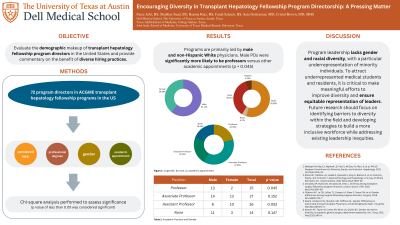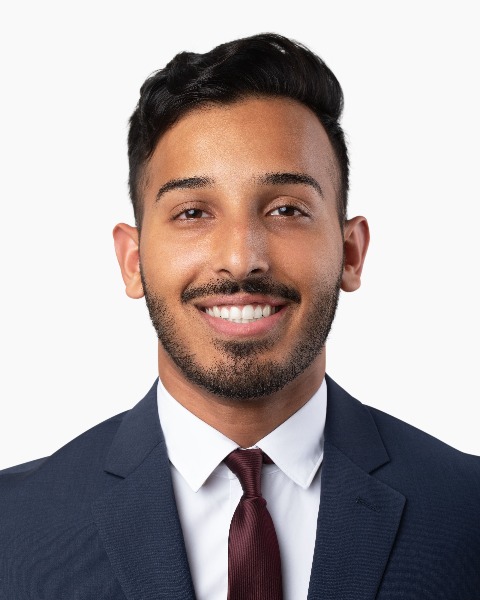Monday Poster Session
Category: Liver
P2353 - Encouraging Diversity in Transplant Hepatology Fellowship Program Directorship: A Pressing Matter
Monday, October 23, 2023
10:30 AM - 4:15 PM PT
Location: Exhibit Hall

Has Audio

Faraz Jafri, BS
Dell Medical School
Austin, TX
Presenting Author(s)
Faraz Jafri, BS1, Shahbaz Saad, BS2, Hamna Riaz, BS3, Farah Saleem, BSA4
1Dell Medical School, Austin, TX; 2Texas A&M School of Medicine, College Station, TX; 3University of Texas at Austin, Austin, TX; 4UTMB John Sealy School of Medicine, Galveston, TX
Introduction: Diversity in medicine has become an important focus due to studies showing the positive effects of race-concordant visits on patient outcomes, adherence, and satisfaction, resulting in more efficient and cost-effective care. While diversity among residency and fellowship program directors has been studied in other fields such as transplant surgery, cardiovascular disease, and psychiatry, little is known about the diversity within niche fellowship programs such as transplant hepatology. This study aims to investigate the demographic information of program directors in transplant hepatology fellowship programs.
Methods: We identified transplant hepatology fellowship programs and their program directors from the American College of Gastroenterology website. Multiple reviewers compiled demographic and training information from internet searches, which was collected in Microsoft Excel and analyzed using chi-square analysis.
Results: Our study analyzed data from 72 program directors, with 61.11% being male. Among the program directors, 55.6% were non-Hispanic White, 36.11% were Asian, while Hispanics and Blacks represented 5.56% and 4.17%, respectively. Our analysis also found that male program directors were largely non-hispanic white (72.72%) and were significantly more likely to be Professors (p = 0.045).
Discussion: Our findings indicate that transplant hepatology fellowship programs are primarily led by male and non-Hispanic White physicians, with female representation in leadership roles comparable to their membership in the workforce. However, we found a lack of diversity among both male and female underrepresented minorities in program director positions. Our study suggests that transplant hepatology fellowship program leadership lacks gender and racial diversity, with a particular underrepresentation of URM individuals. To attract underrepresented medical students and residents, it is critical to make meaningful efforts to improve diversity and ensure equitable representation of leaders. Future research should focus on identifying barriers to diversity within the field and developing strategies to build a more inclusive workforce while addressing existing leadership inequities.
Disclosures:
Faraz Jafri, BS1, Shahbaz Saad, BS2, Hamna Riaz, BS3, Farah Saleem, BSA4. P2353 - Encouraging Diversity in Transplant Hepatology Fellowship Program Directorship: A Pressing Matter, ACG 2023 Annual Scientific Meeting Abstracts. Vancouver, BC, Canada: American College of Gastroenterology.
1Dell Medical School, Austin, TX; 2Texas A&M School of Medicine, College Station, TX; 3University of Texas at Austin, Austin, TX; 4UTMB John Sealy School of Medicine, Galveston, TX
Introduction: Diversity in medicine has become an important focus due to studies showing the positive effects of race-concordant visits on patient outcomes, adherence, and satisfaction, resulting in more efficient and cost-effective care. While diversity among residency and fellowship program directors has been studied in other fields such as transplant surgery, cardiovascular disease, and psychiatry, little is known about the diversity within niche fellowship programs such as transplant hepatology. This study aims to investigate the demographic information of program directors in transplant hepatology fellowship programs.
Methods: We identified transplant hepatology fellowship programs and their program directors from the American College of Gastroenterology website. Multiple reviewers compiled demographic and training information from internet searches, which was collected in Microsoft Excel and analyzed using chi-square analysis.
Results: Our study analyzed data from 72 program directors, with 61.11% being male. Among the program directors, 55.6% were non-Hispanic White, 36.11% were Asian, while Hispanics and Blacks represented 5.56% and 4.17%, respectively. Our analysis also found that male program directors were largely non-hispanic white (72.72%) and were significantly more likely to be Professors (p = 0.045).
Discussion: Our findings indicate that transplant hepatology fellowship programs are primarily led by male and non-Hispanic White physicians, with female representation in leadership roles comparable to their membership in the workforce. However, we found a lack of diversity among both male and female underrepresented minorities in program director positions. Our study suggests that transplant hepatology fellowship program leadership lacks gender and racial diversity, with a particular underrepresentation of URM individuals. To attract underrepresented medical students and residents, it is critical to make meaningful efforts to improve diversity and ensure equitable representation of leaders. Future research should focus on identifying barriers to diversity within the field and developing strategies to build a more inclusive workforce while addressing existing leadership inequities.
Disclosures:
Faraz Jafri indicated no relevant financial relationships.
Shahbaz Saad indicated no relevant financial relationships.
Hamna Riaz indicated no relevant financial relationships.
Farah Saleem indicated no relevant financial relationships.
Faraz Jafri, BS1, Shahbaz Saad, BS2, Hamna Riaz, BS3, Farah Saleem, BSA4. P2353 - Encouraging Diversity in Transplant Hepatology Fellowship Program Directorship: A Pressing Matter, ACG 2023 Annual Scientific Meeting Abstracts. Vancouver, BC, Canada: American College of Gastroenterology.
